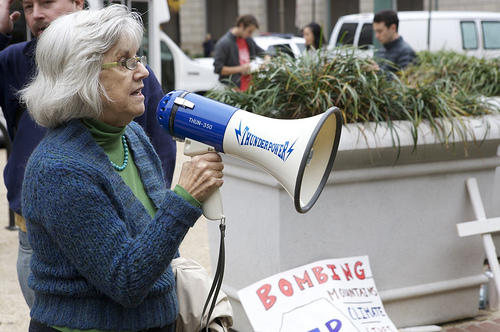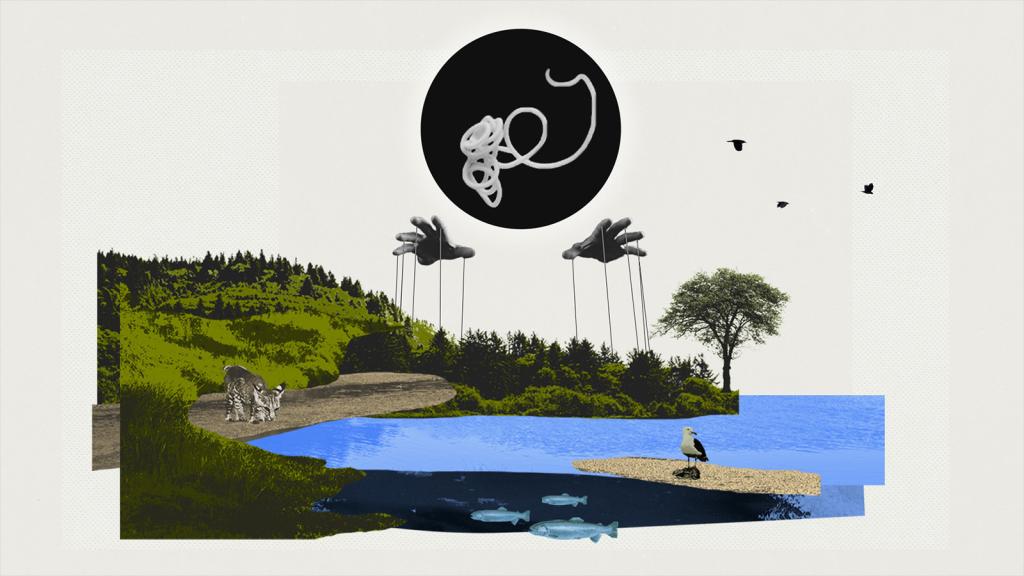We learned with sadness this week that blasting has begun on Coal River Mountain in West Virginia, site of a long battle between Massey Energy and local residents who want the mountain to be a site for 200 wind turbines instead of mountaintop removal coal mining.
Massey has ignored these pleas, despite research showing that a wind farm would bring more jobs and economic stability to the area – and certainly less environmental destruction.
And while we frequently talk about the impact of mountaintop removal coal mining, a Sierra Club Beyond Coal activity from our northwest region last week brings to the forefront the reality of coal mining in the western U.S. as well. The northwest “Dirty Little Secret” regional tour showed residents in Washington and Oregon the tour’s namesake: that the region is hooked on coal power, and its use and mining devastate many communities.
Part of the tour included speeches from Wyoming rancher LJ Turner and Northern Cheyenne Tribe members Otto and Barbara Braided Hair from southeast Montana. All three have seen the impacts of coal mining in the Powder River Basin up close, and they shared their experiences with the crowds along the tour’s stops.
America gets 40% of its coal from the Powder River Basin in Wyoming and Montana. In order to meet America’s massive energy needs, each day over 80 coal trains leave the Powder River Basin bound for power plants across the nation.
For LJ Turner in Wyoming, coal mining is slowly taking away the vast acreage of his ranch.
“They’ve taken away our land, they’re taking away our water, they’re destroying our air – this is affecting us,” said Turner. “We’ve been ranching on government leases since the 1930s, and (mining) has taken 6,000 acres from us so far.” Campbell County, Wyoming, where Turner resides, produces a whopping 35% of the nation’s coal from a series of mining complexes that lay waste to miles of pristine prairie.
Turner said thankfully his family has 10,000 deeded acres that they cannot take away, but that land is still affected because the Powder River Basin mining operations are affecting the water.
“They’re depleting the surface aquifers very heavily,” he explained. “And the coal bed methane is depleting the deeper aquifers, so we’re losing well water and creek water.”
The Powder River Basin includes the nation’s largest surface mine, the Black Thunder Mine. Aquifers and rivers that once irrigated crops and watered cattle are now being used for power plants and dust suppression. Across the prairies and mountains of the Basin, communities have been divided. The region, once home to numerous Native tribes and then family ranches, is now a patchwork of coal mines, power lines, rail lines, and oil and gas wells.
For Otto Braided Hair, it was very important to share the realities of mining to folks who may not think about where their electricity comes from.
“Within minutes of where we live, in almost any direction, there is on-going destruction from coal mining,” he said of his home in southeast Montana. “The blues skies are streaked with a brown haze of pollution, and the sacred waters are being threatened and damaged due to coal bed methane development, among other indications of disregard to the environment.”
Otto said he wants to encourage people everywhere to think about more than just themselves.
“The destruction and damage to homelands or environment anywhere on this earth must be discouraged. People and those in authority must become more caring for life and the environment, and have a deeper, more serious concern for our home, the environment, and the earth.”
He added that his Northern Cheyenne heritage implores him to speak out on this issue.
“The Cheyenne have a deep regard and respectful connection to the elements in the environment – the water, plants, animals, and air,” he explained. “Our highest, most important ceremonies are renewal of life and environment, or protection of life and environment.”
For those who hear about these damaging coal mining practices in the western U.S. or in Appalachia, LJ and Otto have advice on taking action.
“We need to conserve energy as much as anything,” said LJ. “That’s the only way you’re going to get through to these people – if we don’t need fossil fuel energy.”
Otto stressed the importance of thinking about more than the present.
“We must continue to challenge our people in authority to think way ahead in the future. When we’re long gone, there will be people living here. What is it going to be like three, four, five generations from now? That’s where the challenge has to be.
Stay tuned to this blog for updates (subscribe to our RSS feed here) on how you can take action to help save Coal River Mountain.


